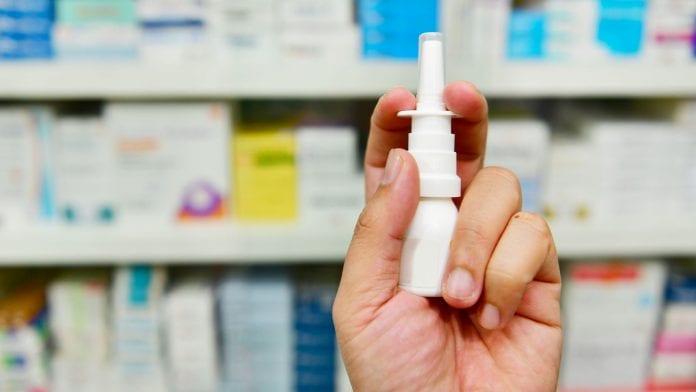
A nasal spray that has been tested in clinical trials and proved to be effective against SARS-CoV-2 has also been found to work against variants of the virus.
Austrian science-based biotech company, Marinomed Biotech, has found that Carragelose – a SARS-CoV-2 prophylactic treatment – inactivates the new, rapidly spreading variants, including the SARS-CoV-2 ‘wild type’ in vitro.
Healthcare professionals in the UK have already taken part in a clinical trial to test the efficacy of Carragelose nasal spray for COVID-19 protection at Swansea University Medical School, and a second trial has taken place in Vienna, Austria, with the primary objective of demonstrating that the treatment reduces symptoms of COVID-19 and other respiratory viral infections.
Marinomed Biotech CSO, Dr Eva Prieschl-Grassauer, spoke to Digital Editor Stephanie Price, to discuss the treatment’s efficacy.
Trapping viruses before they enter the body
The Carragelose nasal spray is a particular subtype of large molecules derived from carrageenan – a type of seaweed – and is a broadly active, unspecific molecule that traps respiratory viruses, including SARS-CoV-2.
Dr Prieschl-Grassauer explains: “It prevents their attachment to surfaces including cell surfaces, so it appears respiratory viruses have something in common because they need to attach to the mucosal cells to get the infection running.
“They have a positive charge on the surface and Carragelose is negatively charged because it contains sulphate groups and, therefore, you have an unspecific interaction. This prevents the attachment of the virus to the cell. If it cannot attach, it cannot go into the cell, and if it cannot go into the cell, it cannot replicate so, this is the mechanism.
“We needed a virus group that could be treated topically – intranasally – because then you can reach them before the enter the system. So, we switched from the more life-threatening infections like HIV to viruses like common cold, and have developed a nasal spray very fast.
“In total, we have conducted three clinical trials with the nasal spray to show that we can translate from in vitro data via in vivo data to a clinical outcome.”
Combatting multiple viruses
The company conducted a clinical trial with an already certified product specialised on the common cold.
“In this trial we could show that we have a very pronounced reduction of viral load in the nasal cavity upon treatment with the nasal spray compared to placebo, and this translates into a clinical outcome meaning a reduction by day two and four during the course of the disease which is a good starting point,” said Dr Prieschl-Grassauer.
“We did a clinical trial in children suffering from the common cold which again showed signs of reduction of viral load upon treatment and the duration of symptoms was shorter with the spray compared to placebo.
“It is important to note the spray does not go into the system, so the chances of side effects is pretty low.
“In children, there is often co-infection with another virus – more than 50% of the children had two of them at the same time which means their specific treatment is probably not working, so, this very broad activity of the Carragelose against a broad variety of viruses is very beneficial because usually we don’t know which virus is really infecting, so this would work better than a very specific treatment.
“The treatment is usually applied as nasal or throat spray, or as a lozenge, because two routes of entry for viruses are the nose or oral cavity. We recommend using the spray up to four times daily because we know that the duration of the product is an average of four hours – and the lozenge is six a day.
“Frontline workers have higher risk of getting infected – this was one of the thinking behind our work, in our trial in Austria we don’t just look for SARS2 but 23 diff pathogens that may infect workers. Every single common cold is really a problem, so I think if you can avoid any respiratory symptoms at the moment people are grateful. In this respect the broader approach to look for different pathogens is probably very reasonable one because there is risks of a new pandemic and we need to be prepared – the product is ready to use.”
Combatting variants
Trials have also demonstrated that Carragelose inactivates new, rapidly spreading variants and the SARS-CoV-2 wildtype with similar efficacy in vitro. Carragelose was able to inactivate all four virus forms at concentrations below 5 μg/ml, which is clinically relevant for the use of Carragelose-containing products.
Dr Prieschl-Grassauer said: “Carragelose has been tested on the three variants which are B.1.1.7, B.1.351, and the P1 variant. The data demonstrate that, with increasing prevalence of virus variants, the marketed OTC Carragelose-based lozenges, nasal, and throat sprays will continue to effectively contribute to combatting the COVID-19 pandemic.
“The treatment is not something which is comparable to vaccination because we have to use it steadily, whereas with vaccination you get it once or twice depending on the treatment schedule.
“On the other hand, the advantage is that you can use it as early as you feel you have come into contact with persons you feel might be spreading a virus. Also with vaccination, you have it against COVID-19, but not other viruses, so the broad band with Carragelose is really the difference, and the third important point to mention is that we can treat children as young as one, which, at the moment, is not possible with vaccinations for COVID-19.
“As we are working against so many different virus strains that use many different receptors, the likelihood that a mutation can escape this treatment is rather low.”






















